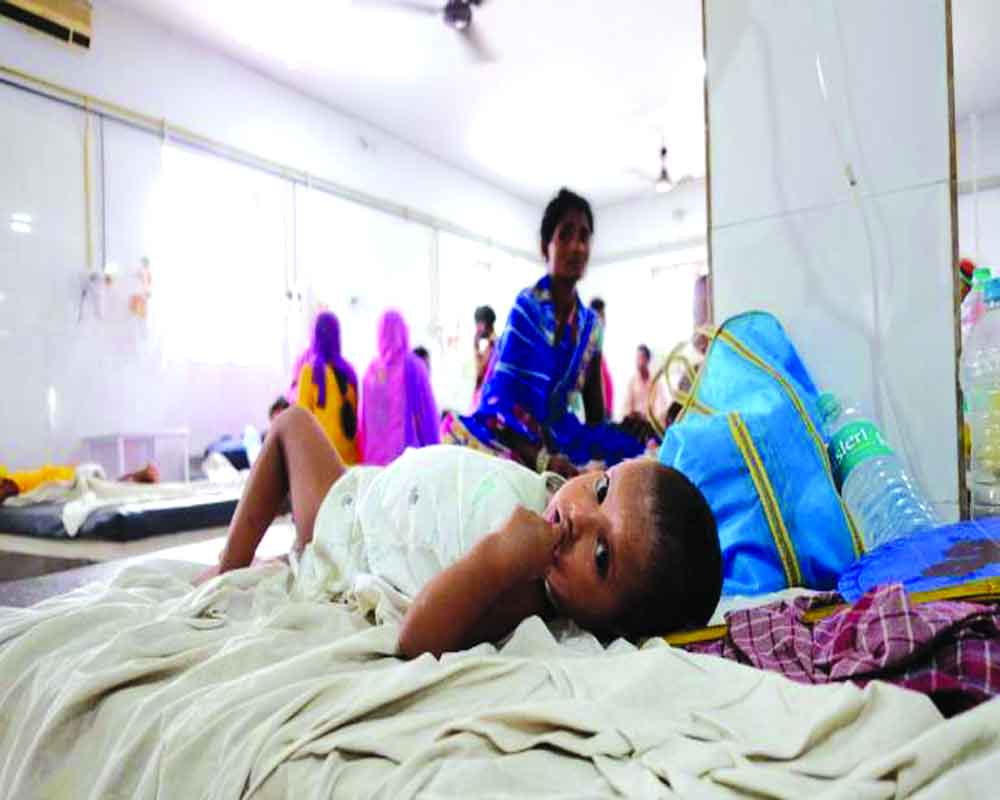Poverty is a threat to human security, and national growth. Encephalitis deaths in Bihar, aided & abetted by extreme malnutrition, draw attention to the need for stabilisation of burgeoning population, particularly among the have-nots who are are unable to ensure well-being of their children in the present system
Recently, Bihar’s Muzaffarpur grabbed the headlines for something the locals would always try to erase from their memory: Death of about 150 innocent children — belonging to the poorest stratum of society — due to acute encephalitis syndrome. In most cases, the children had taken “free” unripe lychees to satisfy their ravenous hunger but the fruit sunk their sugar level fatally low.
The ensued outrage across the nation has once again brought to light the underbelly of the poor socio-economic problem in India: Having a population disproportionate to the capacity to feed.
Although, it is an individual right to procreate, the moot point is whether the right should be availed, given the crushing poverty and horrifying human development indices, particularly in those societies. The question applies to all classes, castes, religions.
India has millions yet to be fed properly. Muzaffarpur is not a one-off case. Starvation, or at least malnutrition, is a stark reality. There are women who give up their wombs to avoid menstruation during their measly jobs. The Bihar case raises questions about the value to life in such dire straits. Don’t parents turn unwitting moral criminals by bringing more children into such an inhuman society?
However, there is no consensus on the problems of the burgeoning population. There is a section in society that considers such inhuman conditions can be eliminated by good governance, delivery mechanism. Well, if it is so easy, then why the “system” has not been fixed in the last 73 years since Independence?
The cliche “just fix the system” is nonsense. Recall how many gallons were once used to water Wankhede stadium in Bombay for an Indian Premier League match, while Maharashtra faced drought. Many who mouth it know they are speaking nonsense. But they say it out of their helplessness and hypocrisy knowing their country has failed in establishing the basics of human life and dignity for all citizens. As they don’t want to accept their country’s failure, they consider poverty-related deaths as normal phenomenon.
The condition leading to children’s death in Bihar epitomises the lives of India’s poor since Independence. They belonged to below poverty line families: a special type of hell. The larger question is, when you are so poor and where life has no value and when death seems better than life, why do the poor reproduce. Is it fair to children? I think procreating in such a world is a crime because they are unable to ensure the well-being of the children.
But the fault isn’t the subcontinent’s only. Nature historians, such as David Attenborough, have used their vast appeal to raise awareness on how earth cannot cope with overpopulation.
In an early scene in the classic Hindi film Anand, Amitabh Bachchan — who plays the character of an idealistic doctor — goes to a Bombay slum to attend to an ailing child who succumbs. Amitabh leaves frustrated, thinking “ek mara nahi, aur dus marne ke liye paida ho gaye.”
So bitter, so true. It’s an insight into how the India’s poor think about reproduction.
In highly unequal societies, the poor continue to breed so many because that is a rare claim to power. As the nation-state system has failed to cope with the problems in society, organised religions have succeed in providing the purported services to the poor. And nearly all of them urge the indigent of their flock to multiply. Nearly all of them are very critical of abortion or population moderation philosophies.
Those who have nothing or made to become nothing have nothing but their reproductive organs to assert their power and acquire some semblance of identity. The poor find strength in their numbers.
It has often crossed my mind, how such a malnourished, underfed, starving Indian subcontinent, reproduces so much? Where do poor South Asians find the stamina to sustain cycles of exponential reproduction? Perhaps, sex and reproduction have nothing to do with calories intake. It defies logic.
(The writer teaches at Jindal School of Liberal Arts & Humanities)


























